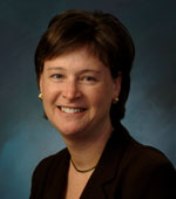
Funds from the Herrick Cancer Research Challenge are allowing promising researchers at the Wayne State University School of Medicine and the Barbara Ann Karmanos Cancer Institute to conduct more in-depth studies on prostate cancer and to understand the racial disparities behind more aggressive and recurrent prostate cancer.
Herrick funding has also added new jobs at Karmanos and are helping researchers secure additional, harder-to-obtain funding to continue their work. Federal research funds are less abundant than in previous years and scientists who go through the grant process typically face tremendous competition from their peers.
Cathryn Bock, Ph.D., and Jennifer Beebe-Dimmer, Ph.D., assistant professors in the Department of Oncology at the School of Medicine and Population Studies and Disparities Research at Karmanos; and Izabela Podgorski, Ph.D., assistant professor of Pharmacology at both entities, are utilizing Herrick funding for their collaborations, which build on an ongoing project, "Racial Disparities, Metabolic Syndrome, Inflammation and Prostate Cancer Outcomes," headed by Isaac Powell, M.D, professor of Urology.
This project is based on the hypothesis that specific biochemical and genetic factors contribute to racial/ethnic disparity in aggressiveness and recurrence of prostate cancer.
Specifically, funding has been used to hire a laboratory technician and research assistant and to procure specialized equipment as the three researchers gather DNA and serum samples from patients to study the association between metabolic syndrome and aggressive prostate cancer. Metabolic syndrome is a cluster of conditions that may include increased blood pressure, elevated insulin levels, excess body fat around the waist or abnormal cholesterol levels, and which may increase a person's risk of disease, including aggressive prostate cancer.
"Herrick funds provide us with immediate resources to act on new ideas," Dr. Beebe-Dimmer said.
Seed funding like the support that comes from the Herrick Foundation also allows scientists to establish preliminary research data, which can then be used to secure more competitive federal funding. But to do that front-end research is challenging without proper resources. Dr. Bock said that with population-based studies like the current project gathering information can be very expensive and time-consuming.
"Having access to detailed data is really important," she said. "Herrick has really helped us supplement the project database. We now have the infrastructure to access more in-depth information."
Researchers have collected about 450 samples over the last two years. Their goal is to gather a total of 600 samples.
"We're ahead of our enrollment schedule," said Dr. Beebe-Dimmer, who added that the database right now is composed of 60 percent African-American samples and 40 percent European-American samples, figures they anticipated would be reversed when they started the project.
"The Herrick funds are helping with recruitment," Dr. Podgorski said. "Specifically, this money has allowed us to hire an additional research assistant who is helping the project coordinator with patient consent and is assisting with patient questionnaires, blood draw coordination, sample storage and data analysis. This significantly improves efficiency of recruitment."
Dr. Bock said the goal of the project is to develop a way in which to detect prostate cancer early and to understand its likelihood of recurrence considering prostate cancer is the most prevalent cancer in men. The American Cancer Society estimates that more than 200,000 newly-diagnosed cases and almost 34,000 deaths will occur in 2011.
"It is critical for us to distinguish aggressive disease from non-aggressive disease," she said. "If we can identify the biomarkers of prostate cancer, that can help us determine who will get aggressive prostate cancer, when they get it, how aggressive it will be and how to treat it."
The three researchers have collaborated for about three years since they met at a meeting of the Prostate Cancer Research Team at Karmanos, headed by Elisabeth Heath, M.D., associate professor of Oncology for the School of Medicine and director of Prostate Cancer Research for the Karmanos Cancer Institute.
"It wasn't until Dr. Heath formed the research team that we began working together," Dr. Beebe-Dimmer said. "It's been a fruitful collaboration."
The Herrick Cancer Research Challenge began in 2009. Prostate cancer researchers have received almost $370,000 so far from the challenge and by the end of the challenge period in 2013, prostate cancer researchers expect to receive almost $550,000.
"Funds that come from the Herrick Challenge are investing in the future of cancer research," Dr. Heath said. "Federal research dollars are not free-flowing and investment is down. With promising researchers, you have to invest in them upfront. Herrick funds help set them up to become independent researchers."
As part of a $3 million commitment, the Herrick Foundation in 2009 awarded Karmanos a $1 million grant to launch several research projects. The foundation also committed an additional $2 million for a fundraising challenge over four years. Karmanos must raise $500,000 in research contributions each year to receive the one-to-one match dollars.
To make a contribution to or learn more about the Herrick Foundation Cancer Research Challenge, click here http://www.karmanos.org/app.asp?id=1194